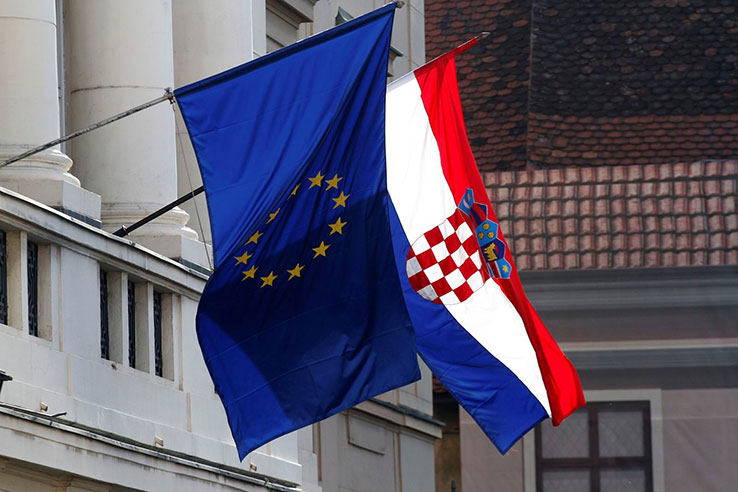Bojana Guberac
 Croatia joined the European Union on the first day of July, 2013. Many feared joining the EU for various reasons. One of the reasons for such fears related to what the EU would bring us. Yet, nearly eight years later, I have the impression that it is no longer a question of what Europe will bring us, but what we have brought to Europe. That is, who got the better end of the deal in that “arranged marriage”?
Croatia joined the European Union on the first day of July, 2013. Many feared joining the EU for various reasons. One of the reasons for such fears related to what the EU would bring us. Yet, nearly eight years later, I have the impression that it is no longer a question of what Europe will bring us, but what we have brought to Europe. That is, who got the better end of the deal in that “arranged marriage”?
Prior to starting negotiations with the EU, apart from being a leader in the region, it was necessary for Croatia to present itself as a well-organized state with friendly intentions towards the neighbors. That is why it was necessary to "embellish and adorn" relations with Serbia. Let’s start from the beginning, that is, from 2004, with Croatia’s Prime Minister at the time, Ivo Sanader, who is currently in prison, having been linked to numerous scandals, mostly corruption. Sanader was then the first senior Croatian official to make an appearance at the Serbian Cultural Society "Prosvjeta" in Zagreb and congratulate those gathered on their celebration of Orthodox Christmas with the words "Christ is born". The gestures remained gestures because Croatian-Serbian relations have remained unchanged to this day, albeit with some ups and downs along the way.
Relations between Croatia and Serbia
Although some positive steps have been taken, that is, high official visits, on both sides, nothing has changed fundamentally. Serbian leadership still does not acknowledge that Serbia carried out the aggression against Croatia, despite numerous verdicts by the International Criminal Tribunal for the former Yugoslavia in the Hague. Regarding the position of Croats in Serbia, the two countries signed an agreement in 2004 that was supposed to provide members of the Croatian community guaranteed seats in Serbian Parliament, however this has not happened to date, while in Croatia representatives of the Serb minority have three seats reserved in parliament.
On the other hand, before the war, the Serb community in Croatia comprised 12 percent of the population, and according to data from 2011, it was reduced to 4.3 percent, so it is not difficult to conclude that Croatia has a problem with the return of the Serb population. The search for those missing, nearly 2,000 people, was highlighted in bilateral meetings as one of the priorities for improving relations between the two countries.
Namely, Croatian authorities and part of civil society in Serbia warned of Serbia's non-cooperation on this issue, given that Croatia had been asking official Belgrade for years to hand over the documents that were seized during the war from the Vukovar hospital, from where a large number of Croatian citizens were taken and open up its archives for inspection and allow investigators to talk to people involved in sanitation and intelligence activities in the area. It took far too long to reach an agreement - until October last year, when it was finally agreed that both parties will try to discover the fate of the missing persons jointly, through field searches and archive inspections. Serbia promised to conduct a search through certain locations on Serbian territory, based on suspicions that the remains of a large number of people are located there.
Croatia, on the other hand, has not followed its all-time exemplar - Germany - when it comes to dealing with the past. There are persistent attempts to suppress in the public realm the crimes committed in the Homeland War by the Croatian side as well, under the incoherent argument that the defending army could not have committed crimes. A step towards a better future was made last year, with the laying of wreaths by the Croatian state leadership in Grubori, where six Serb civilians were killed 26 years ago.
All things considered, it will be a long wait before open and solid neighborly relations are established - not so much because of the people (those who incite hatred are a minority on both sides), but because of the politicians representing these two countries, whose animosity is always welcome before elections.
Corruption inscribed in politicians’ DNA
It would be wildly overenthusiastic to try to summarize everything that has happened in the past eight years of membership. There are certainly too many points to refer to, so it is fairest to look back at a few embarrassing episodes, some of which are broadcast non-stop and are already embedded in our identity as a member of the European Union - not because of the attempt to "dismantle the state", as Prime Minister Andrej Plenković has been repeating in recent days in response to media criticism and the unearthing of scandals related to the government, but because democracy is not only an opportunity, but an obligation for citizens to actively participate in creating healthy societies and states from which young people do not want to flee to Ireland or Germany.
In order to succeed, constructive criticism must not be called "high treason", but must be accepted and certain lessons learned from it. If someone in the function of Prime Minister of a country is unwilling to face well-founded criticism and to deal with the scandals of the persons he himself appointed to important positions, wouldn’t it be appropriate to ask whether he is actually an enemy of the state?
 Source: spiegel.de
Source: spiegel.de
As for corruption, the answer to the question of whether we are going forward or backward depends on how you look at things. When it comes to corruption, Croatian politicians have taken the slogan "The sky is the limit" close to heart. According to the latest data from Transparency International, in terms of the corruption index, Croatia did worse than Rwanda in 2020. For two years in a row, it firmly holds the 63rd place and with 47 points it is far below the EU 64-point average. On that same list, Slovenia has 60 points, Montenegro 45, Serbia 38, Bosnia and Herzegovina and Kosovo 36, and North Macedonia 35 points.
It would be painstaking and truly impossible to list all the scandals that have shaken Croatia in recent years in one text, and for the sake of review, it is necessary to point out that no government has gone without scandals so far. However, if we are interested in where we stand today, then it is inevitable to refer to the current government of Andrej Plenković. At the “political Olympics”, Plenković became the champion in the race for a second term, with 14 replaced ministers, mainly due to scandals related to personal property.
However, the question arises whether corruption in Croatia or corruption in general is considered a crime in Europe, bearing in mind that in November of last year, Germany was hit by a gigantic scandal whose main protagonist was the current head of the European Commission, Ursula von der Leyen. The fact that the head of the Commission supports Plenković's corrupt HDZ was also proven by her appearance in HDZ’s promotional video aired before the July 2020 parliamentary elections. Due to an official complaint submitted to the European Union's executive body by the Croatian NGO Gong, the European Commission has announced that it will develop new guidelines for the participation of its members in election campaigns in Member Countries. Thus, the head of the European Commission did not face any ramifications. There is a popular saying that goes: "the wolf ate the donkey", implying that one was waiting for something to happen, to no avail.
Croatian presidency of the EU - What presidency?
Impossible propaganda was carried out around Croatia's presidency of the EU, with the aim of giving the presidency excessive importance, i.e., proving that, by taking on this duty, Croatia has finally proven that it has passed the process of full integration into the European Union. High hopes were disrupted by the coronavirus pandemic and the fact that meetings were conducted online. The focus of the presidency, logically, has been placed on the current health crisis. Due to virtual meetings, Croatia saved some finances. Instead of the planned minimum of 50 million, 17.8 million euros were spent on the presidency.
The presidency will also be remembered for the fact that the heads of clubs in the EU parliament wrote a protest letter to Plenković's government, accusing him of ignoring the topic of protection of the rule of law in Hungary and Poland during the Croatian presidency. The letter recalls the values on which the European Union is founded, namely "human dignity, freedom, equality, the rule of law and respect for human rights, including the rights of minorities".
The bright spot of the Croatian presidency is certainly the political agreement of the ministers for European affairs of the EU Member States on the start of negotiations with North Macedonia and Albania.
Europe on two tracks, cohesion and development funds
Although the idea of the European Union "divided" into rich and poor members has been nominally abandoned, the Netherlands, Sweden, Austria, Denmark and Germany have already expressed dissatisfaction with the planned Multiannual Financial Framework 2021-2027. As the last member to join the Union, Croatia underutilized the development funds, so it could be said that it has insurance, that is, a certain protection.
Also, Croatia is the only country that has used only one programming period of cohesion policy, so it is announced that it will get more money than other countries. On one hand, we have "friends of cohesion", and on the other hand, countries that want to cut the budget for cohesion policies and redirect money to new priorities such as the fight against climate change.
In any case, the new rules of economic redistribution for the upcoming period also apply to Croatia, which will not profit as much as the individual members that joined the Union earlier, because it is likely that rich members will continue the trend of "pushing" such economic policies in the future. It is also clear that the EU is becoming more frugal, and rich countries are showing less solidarity when it comes to distributing money.
Human rights and the radicalization of society
The digital age and democracy are a civilizational achievement in which the people of Croatia have not managed very well. Although Croatia chose European democracy by joining the EU, the citizens of Croatia still do not understand that in a democracy the people are the government. The citizens of Croatia don’t express their disgruntlement in elections. Instead, they uncontrollably and completely unconsciously "medicate and treat" their dissatisfaction on social media.
The utter misunderstanding of the vast majority of citizens of what freedom of speech represents has led to the horrific appearance of hate speech in the virtual space, that peaked in October of last year, with the terrorist act of 22-year-old Daniel Bezuk, the attacker on the Government building who later took his own life. Bezuk wounded a police officer, and based on the inspection of his computer, it was determined that he had been reviewing information related to Prime Minister Andrej Plenković and President Zoran Milanović for a long time.
Bezuk was declared a hero by several citizens on social media. The only thing that was more shocking than that was to hear Vukovar Mayor Ivan Penava – who should know best what incitement to hatred brings, since he holds high office in Vukovar – calling the terrorist attack a "rebellion". In his typical manner, Prime Minister Plenković promptly "issued a warrant" for the culprits, once again forgetting to look in the mirror to realize that he himself participated in the radicalization of society and that it did not start with social media – we’ve been staring down the ugly face of radicalization since the establishment of the Republic of Croatia.
Radicalization has not been eradicated even by more advanced countries of the European Union, as evidenced, among other things, by the horrific case of the triple murder that also took place last October, in Nice, France. Given the diversity of the different peoples and their consciousness, a difficult task awaits Europe - the Union will have to face a wave of hatred with joint forces.
Finally, we reach the topic of human rights, which, unlike most developed European countries, are much more happily discussed than put into practice in Croatia. This is especially evident when it comes to women's rights. The necessary legal amendments related to violence against women were recently adopted with the help of civil society actions, and to find out how much the adopted laws are actually implemented, it is enough to take a look at the Facebook group #ItConcernsMeToo (#i mene se tiče) and see all the bizarre verdicts. For example, it is worth recalling the verdict from 2020, according to which a police officer who sexually harassed a female colleague for an entire night was acquitted because he did it ONLY ONCE.
All in all, Croatia has not made good use of its eight years of membership, neither in terms of European money nor in terms of the principles of so-called European values. We can only hope that in the future, instead of being ready "for home", it will finally be really ready for Europe.
This blog is published as part of the regional blogging initiative “Tales from the Region”, led by Res Publica and the Institute of Communication Studies, in partnership with Macropolis (Greece), Lupiga (Croatia), Sbunker (Kosovo), Ne Davimo Beograd (Serbia), Analiziraj (Bosnia and Herzegovina), Pcnen (Montenegro), and HAD (Slovenia).
Please refer to the Terms before commenting and republishing the content.
Note: The views and opinions expressed in this article are those of the author and do not necessarily reflect the views of the Institute of Communication Studies or the donor.


